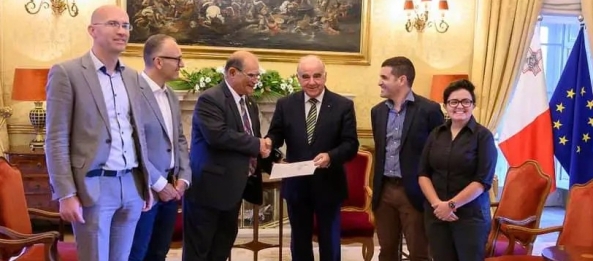Brian hu persuna mimlija enerġija. Hu dedikat. Jiffoka l-enerġija tiegħu b’mod kreattiv favur dak li jemmen fih.
Għandu viżjoni ħadra. Hu aħdar ta’ veru.
Segwejtu mill-bogħod snin twal ilu waqt l-ewwel kampanja elettorali għall-Kunsilli Lokali fl-1992. Dakinnhar kien ġie elett fil-lokalità tal-Fgura għan-nom ta’ Alternattiva Demokratika.
Għaddew 32 sena, u għalkemm bħali, b’inqas xagħar, għadu mimli bl-istess ħeġġa u determinazzjoni li fejn hu possibli jmidd għonqu għall-ħidma biex jagħmel id-differenza.
Dan hu l-impenn politiku tagħna, li bil-viżjoni ħadra tagħna nagħmlu differenza fil-ħajja tal-oħrajn, biex ħajjithom tkun aħjar.
Hemm ħafna xi jsir fuq livell ta’ lokalità. F’kull lokalità hemm ħtieġa ta’ Kunsill Lokali magħmul min-nies li kapaċi jkunu proattivi.
Tul dawn l-aħħar snin, kelli l-opportunità li naħdem mill-viċin ma’ Brian. Miegħu kelli l-opportunità li niddiskuti u nfassal il-ħidma tal-partit f’ċirkustanzi differenti. Fi Brian dejjem sibt persuna li kienet kapaċi tittraduċi l-ftit kliem tiegħi (kultant anke espress b’mod telegrafiku) f’ħidma effettiva.
Fl-elezzjoni ġenerali li għaddiet, jekk Ralph (Segretarju Ġenerali tal-Partit) kien l-id il-leminija tiegħi, Brian, bla ebda dubju kien l-id ix-xellugija tiegħi, biex, flimkien mal-kumplament tat-tim organizzajna l-partit aħjar u bil-ftit riżorsi li kellna irnexxielna kważi nirduppjaw il-voti li ksibna minn elezzjoni ġenerali għall-oħra.
L-isfidi fil-lokalità mhumiex wisq differenti. L-issues li irridu niffaċċjaw huma kemm dawk ambjentali kif ukoll dawk ta’ governanza tajba.
Brian għandu għarfien tajjeb ta’ dak li hemm lest għalih, meta, xahar ieħor nawguralu li jkun elett. Hu kapaċi jkun leħen taż-żgħir, tal-vulnerabbli, tar-resident abbandunat mill-awtoritajiet.
Ix-xahar id-dieħel, bi Brian elett bħala kunsillier, Marsaskala jkollha biex jirrappreżentha persuna determinata li tiddefendi liż-żgħir. Meta nassiguraw li jkun imħares l-iċken wieħed fostna, għandna l-garanzija li nkunu qed inħarsu lil kulħadd. Brian hu l-bniedem li xahar ieħor jagħmel id-differenza.
Awguri Brian.
(diskors f’Marsaskala, Il-Ħadd 12 ta’ Mejju 2024)








